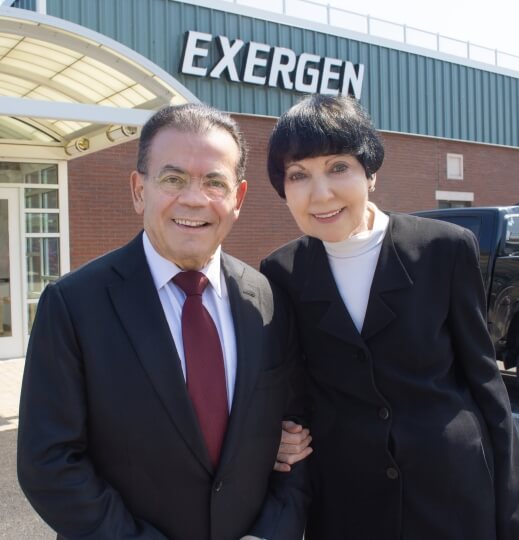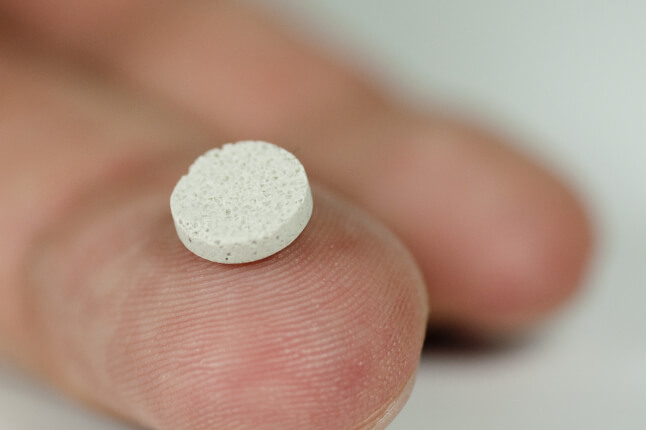News
Francesco Pompei, Ph.D. '02, with his wife and Exergen co-founder, Marybeth Pompei. (Mark Field/markField Design)
Two chiropractors walk into an engineer’s basement.
Almost sounds like the opening line of a joke, right? Yet that’s exactly what happened to Francesco Pompei, Ph.D. '02. It was the 1970s, and Pompei’s industrial device company, Exergen, focused mostly on industrial thermal scanners. The chiropractors dropped by to demonstrate the therapeutic potential of thermometers that could measure temperature on the surface of the skin.
“They wanted to measure cold spots, which can indicate where to do the therapy to eliminate pain in the back,” Pompei said. “When you apply the correct therapy and relieve the pain, the spot gets warmer. That was our first time experiencing that our technology was good enough for medical use.”
That encounter completely changed Pompei’s goal for Exergen, adding a medical device line focused on non-invasive temporal thermometers, which measure body temperatures based on blood flow rate through the temporal artery. Aided by his Ph.D. in engineering sciences from the Harvard John A. Paulson School of Engineering and Applied Sciences (SEAS), Pompei has built Exergen into a company whose products are used in hospitals and millions of homes throughout the world, the United States military, and the White House.
“I knew I wanted to make an industrial product, but the medical aspect came out of left field,” Pompei said. “So, always be open to try a different market.”
Pompei’s ties to Harvard, and specifically SEAS, predate his Ph.D. and even Exergen’s founding. After receiving bachelor’s and master’s degrees in mechanical engineering at MIT, Pompei went into consulting. This was in 1979, when oil crises caused long lines at gas stations and large institutions looked for any way to reduce the cost of heating and cooling their buildings. When Pompei was asked by Harvard to help it optimize its heating and cooling systems, he began working with Fred Abernathy, Gordon McKay Professor of Mechanical Engineering and Abbot and James Lawrence Research Professor of Engineering at what was then the Division of Engineering and Applied Sciences.
“Professor Abernathy really is the godfather of SEAS’ research focus on climate and green energy,” Pompei said. “I quickly realized that if I recommended a drastic change, they were going to spend the money. But in order to do that, I needed to be able to come up with really accurate data about what’s happening in school buildings. I designed a pocket-sized scanner capable of very sophisticated, highly accurate scanning of thermal gradients and thermal integration. Harvard loved it.”
Harvard loved it so much that, when Exergen offered it as its first-ever commercial product, the school purchased several units. It wasn’t long before Exergen began producing thermometers, releasing its first infrared temporal thermometer in 1987. But as Pompei and his wife Marybeth, a former nurse, continued to develop the thermometer line, he realized he needed an advanced degree in engineering to be taken seriously as a medical device manufacturer.
I needed to learn more about medical science, and I also needed credentials. In order to change the way the world takes temperature, you have to be a credible source, and what could be better than a Harvard Ph.D.?
So more than two decades after leaving MIT, Pompei went back to school. Advised by Richard Wilson, Mallinckrodt Professor of Physics (Harvard Griffin GSAS), he wrote a dissertation in which he looked at the role of senescence, a naturally occurring deterioration of cells’ ability to divide and grow, on the much lower incidences of cancer in people over 85 years old.
“It’d been 20 years since I’d done problem sets, so I was thrown into classrooms with all these 22-year-olds, and I was wearing a suit and tie every day,” Pompei said. “It was a big shock for the first few weeks, but I managed it, and kept up with those 22-year-olds pretty well, all while still running Exergen.”
Pompei continued to work with Wilson in the Department of Physics for decades after graduating. In honor of both Abernathy and Wilson, he established a fellowship for graduate students studying climate or the environment at Harvard in 2022.
Through his research at Harvard, Pompei developed the Temporal Scanner, one of Exergen’s signature products. He first demonstrated its potential at Massachusetts General Hospital, in the same surgical amphitheater where the anesthetic effects of ether were first shown to the world.
“I demonstrated, using the industrial model we’d upgraded to a medical model, that when I take the temperature of my finger when it’s near my waist, I get one reading, and then when I raise it up above my head, I get another reading,” he said. “They were amazed by that. We demonstrated how if you change the blood flow rate from the heart, you change the temperature on the skin. That’s the foundation of the temporal artery thermometer.”
Pompei has patented more than 100 devices and technologies in his 40-plus years helming Exergen. The company continues to produce a range of both medical and industrial scanners and thermometers for both home and professional use.
His advice for would-be entrepreneurs and founders: make sure you love what you’re doing, and be open to change.
“If it’s just something you have to do to pass a course, it’s not going to work,” he said. “You have to love doing it, because you’re going to spend a lot of time and energy on it.”
Topics: Alumni, Entrepreneurship, Health / Medicine, Industry
Cutting-edge science delivered direct to your inbox.
Join the Harvard SEAS mailing list.
Press Contact
Matt Goisman | mgoisman@g.harvard.edu



